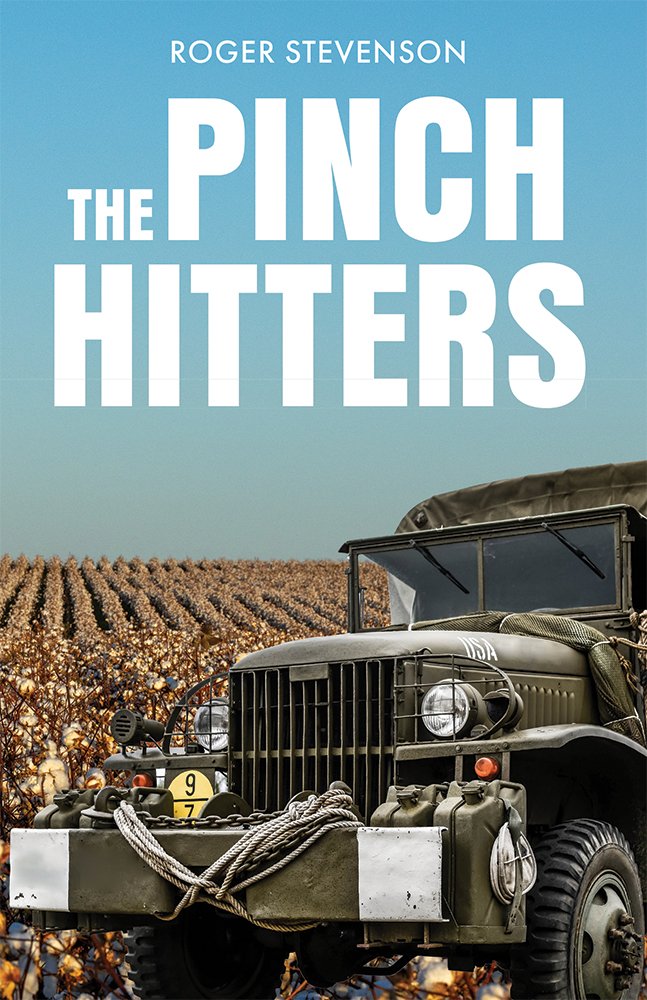Books
The Pinch Hitters
Available to purchase at Wyatt Farms and Bonhomie in Greenwood, SC
or online at Amazon and Barnes and Noble
The flight of young adults in their call to wartime duty after Pearl Harbor placed many farms in the Southland under heavy and protracted strain. Their departure left the farms wanting for their strength, their energies, their skills, their example. The void, when filled, usually fell to the older community left behind. In some instances, the void would be filled by the early maturation of adolescents and less commonly by the entrance of an unsuspected character.
The Pinch Hitters chronicles one South Carolina family facing such an exigency in 1944. The enlistment of the four military-age adults left the farm in the hands of the widowed owner, a teenage grandson, Will, and his black agemate, Sugarbread, the farm’s sharecropper family, an elderly neighbor, and a prisoner of war farm laborer. The challenges and joys that arise from planting season through harvest form the backdrop for teenage Will’s receptive observations of the skills, experience, discipline, values, and behavior of those who “came to bat” for the young men who left the farm to fight in World War II.
Will cultivated significantly different relationships with the major pinch hitters. With Granny Jack, the farm owner, a widow of eighteen years and second-generation descendant of Choctaw Squire Buck Collins, Will was dutifully obedient. With Champ, head of the sharecropper family, he admired the quiet demeanor, strength, and skills of hand. He battled any closeness with Mr. Sif, the knowledge-filled neighbor who kept a caring eye on Granny Jack and her farm. With Henny, the prisoner of war, he swiftly came to worship.
The construction and populating of a Prisoners of War camp within reach of Granny Jack’s farm brought uneasiness to the surrounding community that was never felt by Granny Jack. She saw that the shortage of farm labor could be lessened by engaging the POWs. Mr. Sif and others of like mind saw the POWs as the enemy, a force to be kept behind the camp’s barbwire, certainly not released into the community to create havoc and bring the war onto home soil. Will and his agemate Sugarbread saw the POWs as replacements for their uncles lost to the war, as baseball players, as horse whisperers, and they hoped, as accomplished fishermen and woodsmen.
The realities and fallacies in each of these images of the POWs would play out during the farm’s productive season. One of the farm’s grey mules would come under Henny’s command, baseball would be added to football in the POWs’ athletic prowess, Champ’s son would return home from the war in a casket, Champ would be implicated in the poisoning of the POW farm laborers, and Mr. Sif’s 1936 Chevrolet would be connected to the Klan-like demonstration in front of Granny Jack’s home. These realities and others would interrupt the exploits of Will and Sugarbread, but none would disrupt their friendship.
MARVIN
Marvin was one of two brothers who would be the last to carry the well-established name of Chipley in Greenwood, South Carolina. Since the town’s incorporation late in the nineteenth century, the Chipleys were invested in all of Greenwood’s major enterprises - the railways, the businesses along Syndicate Block, the cotton mills, and Hotel Oregon.
Most of Greenwood’s community accepted Marvin as a beloved and enigmatic citizen, one characterized by overt naivety and mystery that invited prying and imaginative minds. His disappearance triggered the engagement of Sheriff Riley’s meager investigative force and eventually would occupy the attention of the entire town, its college, its hospital, its churches, its bank, its legal system and its art community.
Told from the vantage of Greenwood’s only detective, Blutcher Taylor, and his assistant-in-training, Benjamin Gaines, the story of Marvin unfolds early in the second half of the twentieth century, a period of notable world events, the emergence of air travel to distant locations and cultures, and racial turmoil at home. Marvin’s claims of professorships at a number of universities, including the university of Heidelberg and the Univesrtity of Moscow, and friendships with world leaders, including Great Britain’s young Queen Elizabeth, thrust him into exchanges with strangers as well as those well acquainted with his biography.
The leads that came to the investigative team were tantalizing, but surprisingly few given Marvin’s exploits in the community during his adult life and the prominence of the Chipley family. The most promising of the leads took Blutcher and Ben to Marvin’s daily haunts and to the unyielding stance of Judge Moore when they attempted to pry into Marvin’s bank account and lockboxes. Even their scouring of Mavin’s Cambridge Street mansion had to be conducted with stealth to avoid the eyes and ears of his brother, Elliott, whose belligerence required little for arousal.
Available to purchase at Wyatt Farms and Bonhomie in Greenwood, SC
or online at Amazon

